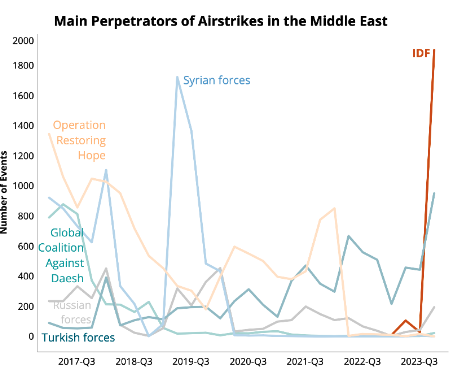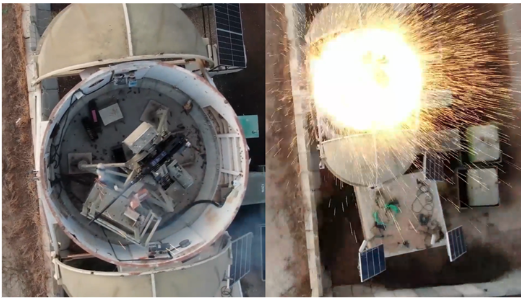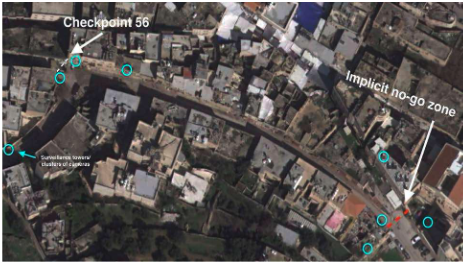Introduction
Israel has become one of the most technologically advanced and AI-driven countries in the world almost 76 years after its foundation in 1948. This Insight examines Israeli artificial intelligence (AI) implementation in the current ‘Swords of Iron’ Operation, launched in response to Hamas’ ‘Al-Aqsa Flood’ Operation on 7 October 2023. It does so by referring to AI systems implemented in previous military operations in the Gaza Strip and by drawing on the broader context of the occupied West Bank, particularly regarding East Jerusalem and Hebron. Furthermore, it aims to assess Hamas’ arsenal and compares the latter with Israeli-deployed weapons. This is necessary to comprehend which weapons the West has at its disposal when facing terrorist threats, but also to set ethical obligations for tech companies when providing products to state and non-state actors – directly or indirectly.
Review of Literature
Firstly, I reviewed newspaper articles and videos addressing 7 October to identify the weapons used to carry out Al-Aqsa Flood and assess the fallacies behind Israel’s defence system to foresee and counter said attack. I then examined official statements by the Israel Defence Forces (IDF) about their own weapons, which range from tanks specifically designed for tough terrains to sophisticated drones and unmanned aerial vehicles (UAVs), shields and radar stations intercepting rockets. Open sources were used to track violence episodes, riots, explosions, and battles in Gaza and the West Bank, confirming that Israel is currently the main perpetrator of airstrikes in the Middle East (Fig. 1). Further research points to a highly advanced AI system, The Gospel (‘Habsora’ in Hebrew) being the catalyst behind the rapid increase of bombing targets.
Lastly, I expanded my search to the occupied West Bank as it is necessary to look at a broader context than the current conflict to fully understand Israel’s implementation of highly advanced technology. Reports and satellite imagery show the deployment of AI systems using biometric data at the gates of and within East Jerusalem and Hebron. Such systems may endanger Palestinian human rights, potentially leading to mass surveillance.

Fig. 1: ACLED data shows that the IDF is the main perpetrator of airstrikes in the Middle East today.
Swords of Iron Operation
Al-Aqsa Flood was the first ground invasion into Israeli territory and Hamas’ most fatal since 1948. At least thirty points along the Israel-Gaza fence were breached, and approximately 1,200 Israelis were killed, about 314 of them soldiers. Israel responded with Swords of Iron, the IDF’s campaign against Hamas in the Gaza Strip. As of early March 2024, over 30,000 Palestinians – many of whom are civilians – have been killed.
However, according to an Israeli intelligence report, Israel may have been made aware of a potential attack at least one year before 7 October. It was unclear how and when Hamas could carry out such an operation. Israel also underestimated the risk it would pose due to its military blockade in Gaza, the collapse of the Egypt-Gaza underground tunnels used for smuggling weapons, and the rudimentary arsenal supposedly at Hamas’ disposal. Hamas’ conversations were intercepted by AI systems such as IntuView’s, on which Israeli forces relied heavily. Hamas’ operatives openly talked and spread false intelligence, tricking the Israeli forces who were listening by confirming they would not be ready to fight against Israel any time soon. Meanwhile, Hamas innovated its fighting techniques from suicide and car bombings to the deployment of drones, paragliders, and bulldozers and boosted self-production, state sponsorship, and looting efforts.
A recent Israeli report raises concerns about Hamas stealing weapons from the IDF. During the attack, some of Hamas’ militants went as far as to disguise themselves in Israeli uniforms. Through official footage and research, it is possible to assess that Hamas used commercial quadcopter drones and ‘Zuwari’ drones to drop explosives (Fig. 2). Israeli observation towers were shut down, and communications systems were disrupted. The Iron Dome – the Israeli radar station countering intercepted missiles between the Israel, Gaza, and Lebanon borders with airstrikes of its own – was overloaded by Hamas’ rockets.

Fig. 2: Footage of drone attacks on 7 October from a video shared on the official Telegram of the al-Qassam brigades (Hamas), acquired by CSIS.
Furthermore, in the current conflict, militants are equipped with Iranian AM-50 Sayyad rifles and PKM-780s, Chinese Type 80 guns, Russian PG-7VR anti-tank rockets and Al-Yasin 105 – rockets made in Gaza. Where the latter two arms are now used to gain a strategic edge over Israeli Merkava IV tanks, Swords of Iron has been so lethal because of Israel’s aerial defence capacity combined with its latest deployed AI system, The Gospel. Drones are seen as “the eyes of the IDF”: Eitan, one of the most well-known drones deployed in Gaza and Lebanon, has the same wingspan as a Boeing 737 aircraft, can withstand all weather conditions, is equipped with its own automatic defrosting system and carries out long-range missions thanks to its 36-hour lifespan. Meanwhile, Skylar I-LE is among the most deployed UAVs as it is almost undetectable and can provide both day and night footage.
Described as a “mass assassination factory” by its own operatives, The Gospel AI system is behind the rapid increase of targets in the current operation in Gaza. It does so by generating targets alongside an estimated number of residents or civilians nearby, an evaluation of danger, and indicators of the presence – or lack thereof – of Hamas militants. Nothing is left to chance. The current Palestinian death toll, therefore, raises alarming ethical and humanitarian concerns. The IDF has not only targeted tactical or underground objectives – respectively, military targets and terror tunnels. Raids have also been directed at power targets (such as residential and public buildings) and family or operative homes (private homes tied to Hamas militants). 10% of rockets presumably fail to detonate and may be looted by Hamas afterwards, likely contributing to enhancing the group’s arsenal in the war.
Israeli AI Deployment in the West Bank
According to Amnesty International and New York Times reports, after Israel’s illegal annexation of the West Bank in 1967, today, its occupation may amount to “automated apartheid”. This is due to the discriminatory deployment of advanced AI systems in the areas of East Jerusalem and Hebron for identification and monitoring purposes. For instance, Mabat 2000 is a government video surveillance system in East Jerusalem that uses facial recognition technology. CCTV cameras in the Old City (Jerusalem) broadcast live footage to the police 24 hours a day, allowing them to track individuals and prevent peaceful protests or any other unwanted event from happening. After the Sheikh Jarrah protests against the eviction of Palestinians from their homes in 2021, caused by a longstanding Israeli-Palestinian dispute over land ownership, Israeli controls became even more stringent, forcibly evicting Palestinians from their homes. The surveillance system is also mounted in illegal settlements like Ariel and The E1 Plan, often to prevent Palestinians from freely entering the settlements and to document their every move.
In Hebron, AI systems, databases, and CCTV cameras processing biometric data are deployed at the city’s gates, crossroads and alleyways. The Hebron Smart City Initiative detects unusual events for narrative purposes. For instance, Wolf Pack is an extensive imagery and information database on Palestinians, working in tandem with facial recognition systems: soldiers call on a ‘war room’ to receive orders on potential arrests or releases. Introduced in 2020, Blue Wolf is a gamified ‘Facebook of Palestinians’ where IDF soldiers can check and upload photos, positions, and detailed information about Palestinians accessing the city. Red Wolf – the latest Israeli experimental facial recognition system – has been scanning Palestinian faces since 2022. Depending on the assigned colour, Palestinians are then allowed into Hebron, chased off, or brought in for questioning. Amnesty International believes that there is a high likelihood that these systems are connected.

Fig. 3: Implicit no-go zone past Shuhada Street (Hebron) – Amnesty International, ‘Automated Apartheid’.
These AI systems are used at the expense of Palestinians, potentially leading to mass surveillance and other human rights violations. Other West Bank-exclusive processes such as the Settlement of Land Title (SOLT) – initiated in 2018 to finalise ownership of Palestinian land in the Israeli land registry, Tabu – and the implementation of military courts to prosecute Palestinians (even children) raise further ethical and humanitarian concerns.
Results and Recommendations
In 2022, the Stockholm Peace Research Institute (SIPRI) ranked Israel among the fifteen countries with the highest military expenditure. With a solid 2.3% share from 2018 to 2022, Israel was ranked among the world’s ten largest major arms exporters. Its three main recipients were India, Azerbaijan, and the Philippines. A recent official statement shows that 24% of Israel’s defence export shares are headed to US-sponsored Abraham Accords countries, such as the United Arab Emirates and Bahrain. As Israel provides authoritarian regimes with high-tech weapons and possibly new AI solutions, it is crucial for companies – both local and international – to comply with international law. This is especially pertinent when considering the current conflict, which led the International Court of Justice (ICJ) to indicate provisional measures to Israel to prevent genocide in Gaza.
As Western allies such as the United States and Germany increase military aid to Israel, they should also ensure international policies are being implemented by their ally. For instance, US State Department Spokesperson Matthew Miller stated that no assessments had been made on Israel’s indiscriminate bombings and use of US-supplied munitions. Yet, the drastic civilian death toll in Gaza shows that the Israeli government and its international allies should reassess their actions to prevent further innocent bloodshed.
On the other hand, the AI advancements of the Israeli military confirm a positive outlook for Western states and their allies in the face of terrorism. Even though Hamas has managed to upgrade its arsenal, the results are not comparable to those that state-powered defence and research can reach. In this regard, Israel funds innovative tech startups and promotes its best students through its Academic Reserve to access university education, postponing conscription or exempting them from it.
Israel and international companies must consider ethical implications – whether they are providing Israel’s defence compartment or its broader monitoring efforts with tech solutions. Tech and defence companies worldwide must also keep in mind that Hamas may continue to loot Israeli weapons and innovations. Specifically, European companies may wish to consider the latest EU Artificial Intelligence Act when considering the relationship between the European Union and Israel, forged on shared values such as democracy and respect for human rights. Globally, companies might only partake in agreements with Israel if suppliers are allowed transparent access to their products and to reports about the subsequent use of data acquired. In case of non-compliance or violation of any signed agreement, sales should be immediately terminated.
On more ethical grounds, European companies should strive to create products compliant with the Ethics Guidelines for Trustworthy AI, which mandates that AI should be (i) lawful, (ii) ethical, and (iii) robust. Globally, the October 2023 report by the International Committee of the Red Cross (ICRC), ‘Protecting Civilians Against Digital Threats During Armed Conflict’, proves immensely valuable for tech companies, among other actors. It sets four guiding principles in the context of hostilities: (i) digital space is not a lawless space, including during armed conflict; (ii) protecting civilians requires investment in legislation, policies, and procedures; (iii) political and military leaders should focus on protecting civilians; and (iv) state, tech companies, humanitarian organisations, civil society and other stakeholders should join forces to use digital technology to enhance the protection of civilians.
ICRC Recommendations could support both Israeli and global companies in setting their own ethical guidelines with the purpose of respecting the rights of all civilians involved in the conflict. Special care must be taken to protect the Palestinian civilians of Gaza and the West Bank; they must be equally valued in their rights to life, non-discrimination, privacy, freedom of movement, freedom of expression and peaceful assembly.
Paola Testa is a Junior Analyst at Istituto Analisi Relazioni Internazionali (IARI). She specialises in the MENA region, focusing on human rights and humanitarian issues, women’s rights, equality and inclusion. An ‘advocate for the diverse’, she has represented the voices of all kinds of people in fiction, on social media, and through geopolitical analysis.
